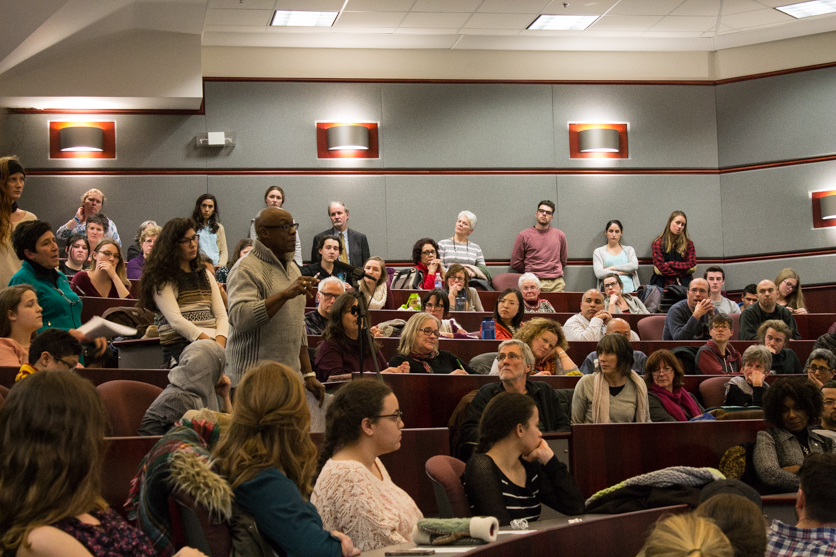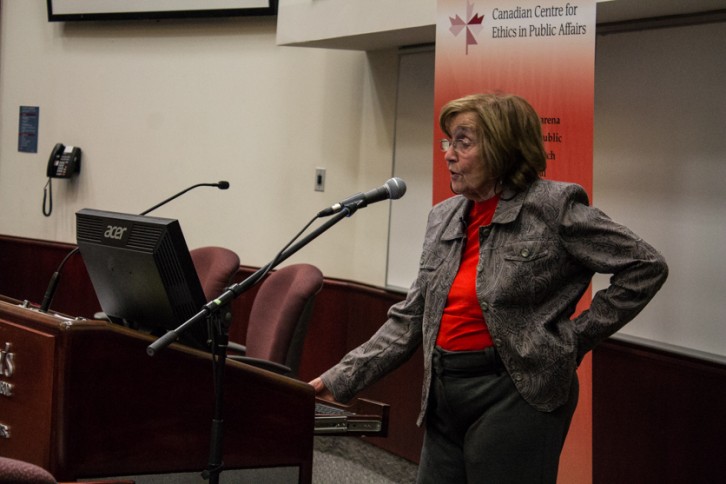Inequality
SMU speakers hoped to spark conversation about racism
First of four events focuses on white privilege; everyday racism

caption
Audience members asked about possible remedies for racism.
caption
Audience members asked about possible remedies for racism.An audience at Saint Mary’s University on Wednesday night heard the impact of white privilege remains poorly understood.
The event brought in Frances Henry, an expert on the study of racism from York University. She said many people believe that racism happens only overtly – and if they don’t see it, it doesn’t exist.
“The reality is that white privilege affects the everyday experiences of racialized people,” said Henry. “Everyday racism includes small acts like not shaking someone’s hand, or not sitting next to a racialized person on the bus.”
Henry’s work includes co-authoring Racism in the Canadian University, a study on how racism and white privilege affect institutions of higher education.
The speaker series is co-organized by the Canadian Centre for Ethics in Public Affairs (CCEPA) and the ENRICH Project, which is a research project on environmental racism in Nova Scotia.
Starting the healing process
The director of the ENRICH Project, Ingrid Waldron, said when CCEPA approached her about organizing the series on racism, she knew it was the right timing.
“Black students at Dalhousie have talked to me about racist graffiti at the Killam Library. They’ve talked about discriminatory comments made in classrooms by professors,” said Waldron, an assistant professor in the School of Nursing at Dalhousie University. “I see in my classroom how these issues affect students.”
Waldron wants these events to build a conversation about racism so people can feel more comfortable talking about it.

caption
Frances Henry spoke about why and how racism exists.“In Canada we don’t like to discuss (racism). We don’t look at the ways we are racist,” said Waldron. “Racism has been harmful to people of colour because they don’t feel a part of society.”
She said they will start healing from this harm when others are able to say “I get it. I agree. It exists.”
This can take time, but she sees these events as an opportunity to start the process.
“I hope the people who are in the audience will connect with the speakers and realize — maybe there’s something I can do in my department, my university, my work.”
Darryl Leroux, an assistant professor in sociology at Saint Mary’s University, also spoke at the event. He told the audience some of his students have been told: “Never go to Gottingen Street. Your life depends on it”.
“There’s this assumption that places associated with black people are dangerous,” said Leroux. This attitude is what provoked the speaker series.
The need for diverse dialogue
Zahra Dhubow enjoyed the event, but said there needed to be dialogue from different members of the community, rather than only white people speaking to the white perspective.
“When two people of different races have a conversation, more can be done. By having two different perspectives I think we as an audience would have gotten more out of it,” said Dhubow.
Anne Sinclair said seeing so many people at the event gave her hope, but she expected more optimism from Henry.
“I would have liked if she had talked more about what some possible solutions might be,” said Sinclair.
The next three events of the series will discuss black perspectives, indigenous perspectives and immigrant perspectives.
More details on the series available at: http://www.ccepa.ca/archives/2015_2016/racism.html

